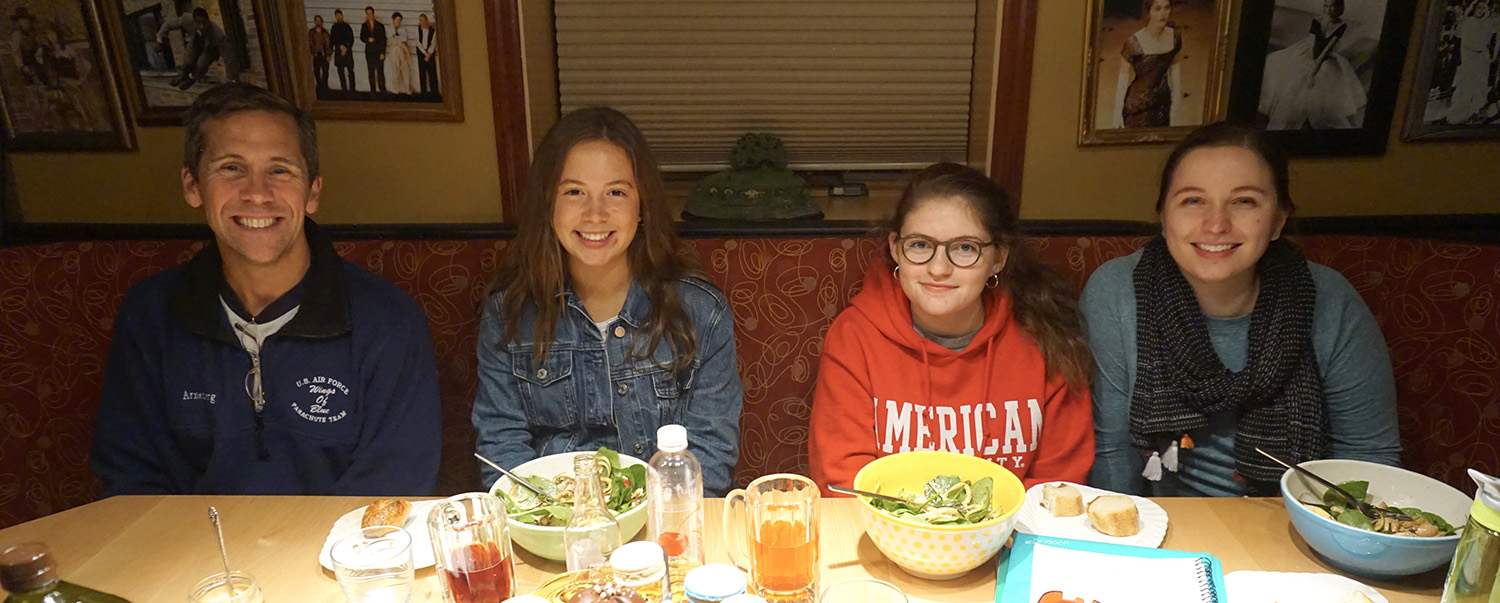“In everyone’s life there is much to be grateful for and also much to be unhappy about… Unfortunately, most of the time our emotions dwell on our problems and forget about our obligation to gratitude. […] All people have within their grasp much to be thankful for. Gratitude fills. Grumbling drains. The choice is yours.”
—Richard Swenson, Margin (Colorado Springs: NavPress, 2004), p. 92 (emphasis mine).
Thanksgiving is my overall favorite holiday. I’m not saying it’s the most theologically significant or the most spiritually fulfilling, but it’s my favorite. Highlights: permission to maximize feasting and recreational time with extended family; a welcome late-fall break from school and work; no expectations or pressures of gift exchanges; no being overshadowed by the intense busy-ness of Juggle Jam season (as is often the case with Redemption Weekend, aka Easter). I have many fond memories of basement table tennis tournaments, walks through early snowfalls, brisk 5K races, touch football, my first holiday spent with Wendy’s family on the farm, and countless hours of board games, most notably with my fellow Type-A competitive nephews in Chippewa Falls.
Despite its non-sectarian appeal and the fact that no observant Jew or Christian would say that Thanksgiving is more important than Passover, Yom Kippur, Christmas, or Easter, I assert that the concept of thanksgiving, or gratitude, should be celebrated every day of every human’s life. This assertion lands squarely in our Margin series. If one were to succinctly answer the challenge to the subtitle to our book of focus, “Restoring Emotional, Physical, Financial, and Time Reserves to Overloaded Lives,” gratitude is easily an operative word for all four areas listed.
It seems to me that one reason that we’re overloaded as a society and as individuals in so many areas is that we’re ungrateful with our current circumstances. Burnout, in one way or another, is related to presuming that we have no limits or that we’re far from reaching those limits. Speaking for myself, my open struggle against perfectionism and guilt is often rooted in an attitude of ingratitude. Rather than constantly struggling and striving to better myself (e.g., my happiness, fitness level, investments, and schedule efficiency), I should step back and learn to enjoy what I already have in all of these areas (and more).
One who is grateful is less prone to worry about what is lacking but is rather thankful for abundant blessings. Gratitude means reducing the tendency of multi-tasking productivity (whether related to work or trivial pursuits) but instead enjoy doing one thing at a time, and doing it well. For me, it means I won’t worry (as much) about whom I’m not serving any given time, because if my schedule has margin and I’m called upon to help (at club or on a free evening), I’ll not only be available, I’ll be grateful to be used by God to be a blessing to others.
This very thing happened at the start of November. Wendy & I had a free Saturday night, and while we considered planning ahead to host guests, we refrained for some reason. Then, the day before our “found time,” my brother, Jim, asked if we could host his family for an evening to help his twenty-something son, our nephew Levi, recover from hand surgery. Not only was I grateful that he asked, but we all had a great time, and it was a mutually fulfilling excuse to catch up and be edified.
Back to that Richard Swenson quote above. I very much appreciate his admonishment, “our obligation to gratitude.” We often see thankfulness as sort of a kind-hearted bonus virtue, but Swenson reminds us that it’s actually required for anyone who seeks to live a balanced life of margin. One of my former church choir directors once dusted off an old Sunday school classic which he sang as a child. Its title and chorus went as follows: “Are You Humbly Grateful, or Grumbly Hateful?” Grammatically cutesy, perhaps, but it poses a profound question.
Here are a few more quotes that I often think about to steel my mind toward a gratitude attitude while avoiding stumbling over grumbling:
The quintessentially innocent Buddy in Elf (2003) when he continuously accepted pamphlets on the street during his first visit to New York City: “THANK you…THANK you…THANK you…”
Audrey Arneberg, my mom, admonishing her five kids to avoid covetousness as she raised them from 1957-1985: “Want what you have.”
The Apostle Paul: “Do all things without grumbling or disputing.” Philippians 2:14 (ESV)
The Apostle Peter: “Show hospitality to one another without grumbling.” 1 Peter 4:9 (ESV)
The number of times that the Bible uses synonyms for “thankful” or “grateful”: 172. In the overwhelming majority of those instances, gratitude is expressed in the context of prayer. Prayer itself is an act of humility and faith-based gratitude for One who hears our needs and receives our praise.
Gratitude is one way of acknowledging that the blessings we enjoy result from others’ intentional acts of kindness. Daily gratitude is essential for humbly and obediently living a life of margin while hedging against grumbling, arrogance, and burnout.


